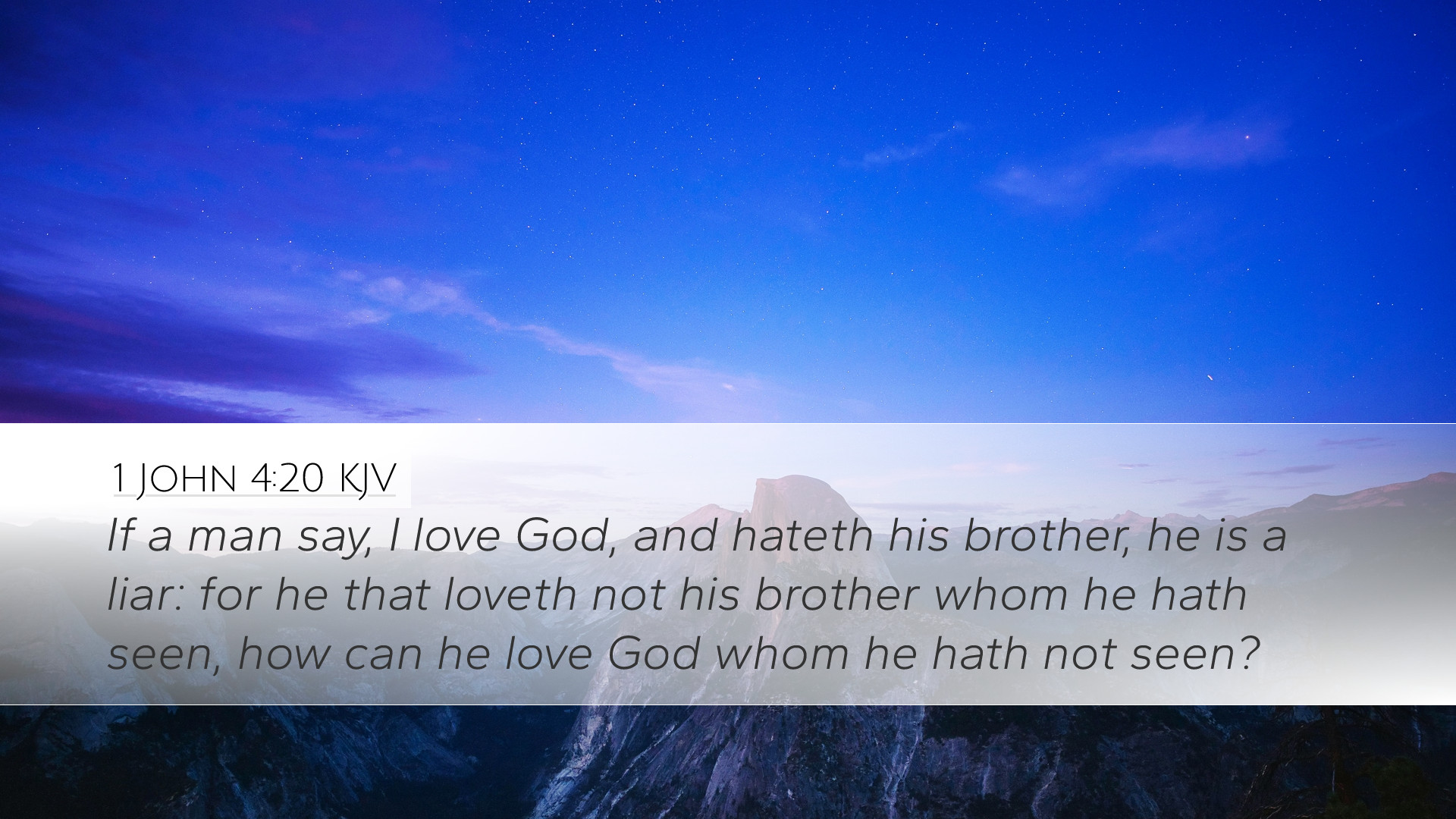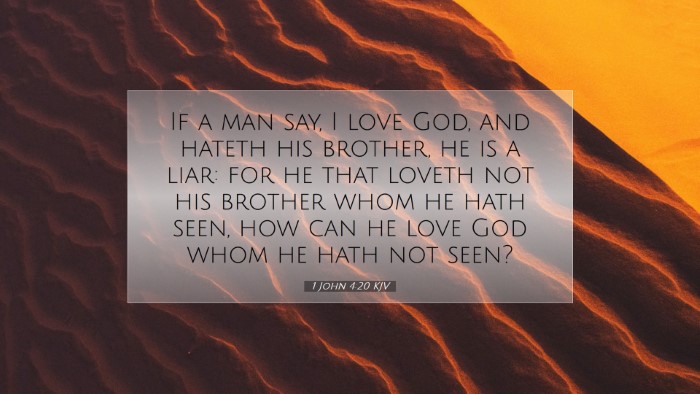Old Testament
Genesis Exodus Leviticus Numbers Deuteronomy Joshua Judges Ruth 1 Samuel 2 Samuel 1 Kings 2 Kings 1 Chronicles 2 Chronicles Ezra Nehemiah Esther Job Psalms Proverbs Ecclesiastes Song of Solomon Isaiah Jeremiah Lamentations Ezekiel Daniel Hosea Joel Amos Obadiah Jonah Micah Nahum Habakkuk Zephaniah Haggai Zechariah Malachi1 John 4:20
1 John 4:20 KJV
If a man say, I love God, and hateth his brother, he is a liar: for he that loveth not his brother whom he hath seen, how can he love God whom he hath not seen?
1 John 4:20 Bible Commentary
Commentary on 1 John 4:20
Verse Text: "If someone says, 'I love God,' and hates his brother, he is a liar. For the one who does not love his brother whom he has seen cannot love God whom he has not seen." (1 John 4:20, NASB)
Introduction
This verse from the Apostle John presents a profound truth concerning the relationship between our love for God and our love for others. In this commentary, we will explore insights from various public domain commentaries, focusing on the essential principles articulated by authors such as Matthew Henry, Albert Barnes, and Adam Clarke.
Contextual Background
John’s first epistle addresses the nature of true fellowship with God and the evidence of that fellowship manifested through love. Throughout this letter, John seeks to assure believers of their faith and to guide them away from misconceptions about God's nature and their identity in Christ.
Exegesis of the Text
Conditional Statement
“If someone says, 'I love God,'” - John introduces a hypothetical scenario which sets the groundwork for his argument. This conditional introduces the expectation of love as an essential criterion for authenticity in the believer’s relationship with God.
Contradiction Highlighted
“and hates his brother, he is a liar.” - The contradiction is stark; John uses strong language, labeling as a 'liar' anyone who claims to love God yet harbors hatred towards another person. This labeling aligns with the teachings found in Matthew Henry's Commentary, which explains that true love for God must naturally overflow into love for others.
Observation of Love
“For the one who does not love his brother whom he has seen cannot love God whom he has not seen.” - John emphasizes the importance of love's tangible expression. Albert Barnes notes that loving others is a visible, practical demonstration of the inward love for God. The notion is that if one cannot love a visible brother, how can they claim an unseen love for God?
Theological Implications
- Love as Evidence of Faith: This passage forthrightly asserts that love is an essential evidence of genuine faith. Adam Clarke clarifies that the essence of Christian love is defined by active and sincere goodwill towards others.
- The Nature of God is Love: John's epistle expounds upon the nature of God as love (1 John 4:8). Thus, a claim to love God necessitates a corresponding love for others, as our relationships reflect our understanding of God.
- Ethical Examination: The challenge posed to believers is one of ethical self-examination. How does one measure their love for God against the reality of their interpersonal relationships?
Practical Applications
For pastors, scholars, and students of the Word, there are several practical applications to consider:
- Encouragement of Authentic Community: Foster a community where genuine love for one another is encouraged as a reflection of one's faith in God.
- Exhortation to Personal Reflection: Regularly examine personal relationships and ask: 'Is my relationship with God evident in how I treat others?'
- Preaching the Word: Preach love as a non-negotiable tenet of Christian faith, using this passage to challenge congregants to embody love actively.
Conclusion
1 John 4:20 resonates with a deep and enduring truth: our assertions of love for God are valid only when they are substantiated by our love for others. Both John and the commentators emphasize that this love is not merely a feeling but an active choice arising from a transformed heart. This truth is vital for anyone desiring to deepen their walk with God and engage meaningfully in the lives of others.
As we reflect on this passage, let us be challenged and encouraged to express our love for God through tangible acts of love towards our fellow brothers and sisters.


